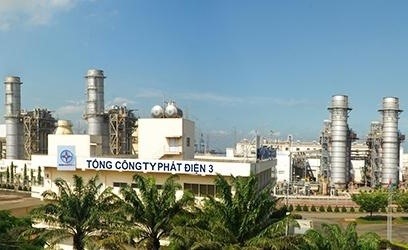 Economy
Economy

The failure of the Power Generation Corporation 3 (Genco 3) to sell its stake through initial public offering (IPO) has raised concerns about the upcoming IPO’s of the two other similar companies – Genco 1 and Genco 2 – at the end of this year.
 |
| The failure of the Power Generation Corporation 3 (Genco 3) to sell its stake through initial public offering (IPO) has raised concerns about the upcoming IPOs of the two other similar companies – Genco 1 and Genco 2 – at the end of this year.— Photo baodautu.vn |
HÀ NỘI — The failure of the Power Generation Corporation 3 (Genco 3) to sell its stake through initial public offering (IPO) has raised concerns about the upcoming IPOs of the two other similar companies – Genco 1 and Genco 2 – at the end of this year.
In early February 2018, Genco 3 offered 267 million shares for IPO sale, equal to 12.48 per cent of its charter capital, at the starting price of VNĐ24,600 (US$1.09) per share.
However, the company only sold 7.5 million shares at the IPO, collecting VNĐ184.4 billion from the IPO.
The deal was considered a failure. The subsidiary of the State-owned conglomerate Electricity of Việt Nam (EVN) also wanted to sell 36 per cent of its charter capital to the strategic investor within a month of the IPO.
In late January 2018, EVN deputy general director Đinh Quang Trị told local media that four investors from India, Thailand, South Korea and Middle East had registered to purchase 36 per cent stake of Genco 3.
However, it was difficult for Genco 3 to carry out the strategic deal due to shortage of time for potential investors to prepare their finance and required procedures.
According to deputy minister of industry and trade Đặng Hoàng An, the size of Genco 3 was big, making its value quite high to investors, leaving many unable to purchase all of shares offered.
“State-owned enterprises (SOEs) having sold State capital before Genco 3 had attracted most of investors’ attention, plus, their market capitalisation was also huge so it was difficult for investors to absorb Genco 3 at the IPO and the strategic sale later,” Đầu Tư (Investment) newspaper quoted An as saying.
Before the IPO of Genco 3, three energy firms who launched their IPOs were Bình Sơn Refining and Petrochemical Company (BSR), PetroVietnam Oil Corporation (PV Oil) and PetroVietnam Power Corporation (PV Power), selling total VNĐ17 trillion worth of shares.
According to Nguyễn Trọng Oánh, General Director cum Chairman of Đa Nhim-Hàm Thuận-Đa Mi Hydropower JSC (DHD), it often takes ministries and sectors several years to make investment in a hydropower plant, therefore, it is impossible for a strategic investor to purchase a majority of ownership in a power company in just a few months.
“After DHD was equitised in 2010, a number of foreign investors were interested in becoming the firm’s strategic investors. They brought along lawyers, consultants and financial analysts to work with DHD officials to study the company, and it took them a few months to decide to buy 35-49 per cent of DHD charter capital,” Oánh said.
“In the case of Genco 3, a 36 per cent stake is large for any investors to afford. In addition, it should take investors time and effort to study a corporation of many power plants, and it is much different to studying a single power plant,” he said.
According to some foreign investors, insightful corporate assessments will be conducted on Vietnamese power firms as Việt Nam’s electricity prices are not cheap. In addition, the implementation of the project would often cost more than the initial plan, so it often takes years for them to make the final decision.
Foreign investors are concerned about the quality of transparency, corporate governance and accounting among Vietnamese firms, Oánh added.
All power plants of DHD are hydropower plants – which are completely different from Genco 3 which is made up of thermal, coal and hydro power plants and those plants are located in different places – so it is easier for investors to do business evaluation on DHD than on Genco 3, according to Oánh.
“Investors would prefer making investment in DHD than other power firms due to its visibility of assets and finance despite low efficiency, plus, the issue of electricity prices has remained unclear,” he said.
According to Deputy Minister of Industry and Yrade Hoàng Quốc Vượng, foreign investors are not keen on investing in a large-cap power corporation like Genco. But it may be easier to lure them to buy shares of Genco power plants due to accessibility of information disclosures and fewer risks.
Racing with schedule
The two other EVN sub-units – Genco 1 and Genco 2 – are preparing for their IPOs this year by selling shares of the two corporations, not shares of their power plants.
According to some analysts, the two firms’ IPOs have encountered some challenges regarding their land use rights as their asset evaluations have followed the instructions stated in the Decree 59/2011/NĐ-CP and not matched requirements of lately-issued policies such as the Decree 126/2017/NĐ-CP and Circular 41/2018/TT-BTC.
They could have to re-evaluate their land properties and submit to the authorised government agencies for approval before making final decisions on the IPOs.
Electricity price is also another major concern and the pricing policy needs clarification of EVN and must be transparent, analysts say.
Those issues will take more time and effort for those two firms to throw their IPOs this year and may discourage investors from taking part in those deals, they say. — VNS




